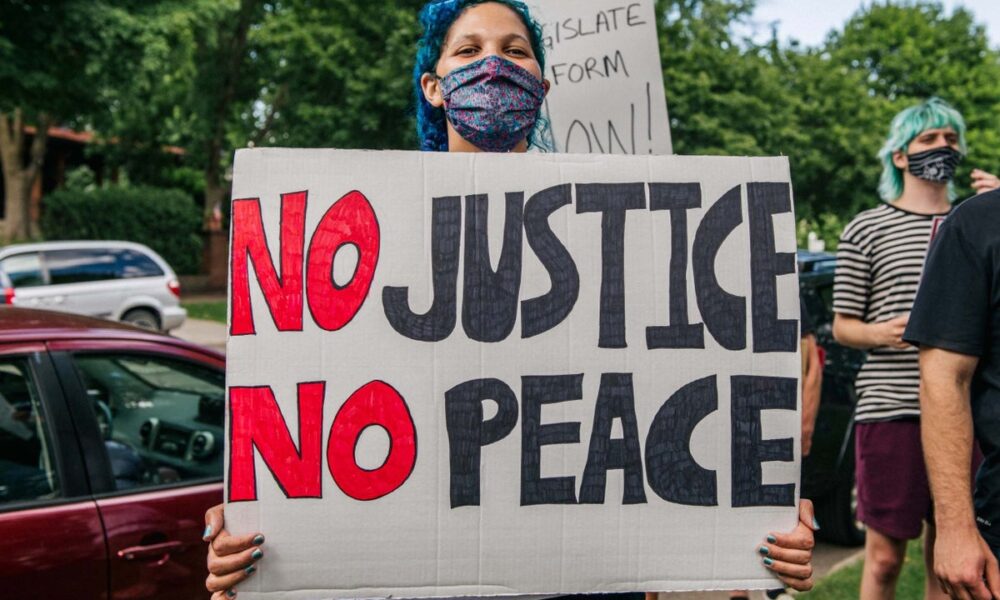Content warning: racism, police violence
In the past several days, three high-profile cases have come to deeply unsatisfying conclusions. Two are American—Kenosha shooter Kyle Rittenhouse was cleared of all charges after he killed two men during a night of unrest following the shooting of Jacob Blake, and the three white men who murdered Ahmaud Arbery, much like a modern-day lynching, were convicted. The other is Canadian, the least known and covered of the three: Pradel Content, a Black man living in Laval won an ethics case against a police officer who shoved him, made racist comments toward him, and then deleted Content’s phone recording of the 2017 incident. Many have raised concerns about Rittenhouse’s proceedings, questioning whether he would have still been found innocent, or even alive, had he been Black. And though Arbery’s mother expressed her relief at the guilty sentence, it, of course, remains unjust that a Black person still cannot move freely through society without fear. The just application of the law cannot save a Black life taken too early. Content’s case reveals an insidious aspect of Canadian anti-Black racism; that is, the constant and unhelpful positive comparison to the United States and the “moderate” bureaucracy that holds onto these cases for years.
The report did not contain a valid reason for why Michael Boutin, the officer who stopped him, would need to check Content’s licence plate. In a statement by the Centre for Research-Action on Race Relations, Content shared that he started recording once he exited his car at a gas station. Noticing that Content was filming him, Boutin proceeded to slap the phone out of his hand, throw him against his car, and handcuff him without informing him of the reason for the arrest. Later reports, including ones that led to the ethics violations, found that Boutin filed a false police report and wrote a ticket that suggested Content was using his phone while driving. During their encounter, Content mentioned he was from Florida, to which Boutin replied that he must be lucky to live in Quebec because in the United States they shoot people “like you.” Since this comment targeted his race, the ethics committee found this to violate their ethics code, amongst five other ethics violations. This comment stings even more considering that George Zimmerman, the man who shot and murdered Trayvon Martin, was acquitted of all charges in Florida. Boutin’s lack of ethical standards reveals the lack of oversight in police systems. It is important to remember that Boutin was not alone at the time—his fellow officer could have easily stopped him. Their choice to stand silent and even erase their actions is in line with Canadian ideals, wherein the propagated culture of politeness and respectability comes at the expense of racialized people and substantive changes to policing.
It is concerning that Content’s case not only took four years to conclude, but remained relatively unacknowledged beyond local news articles. The ticket Content received was immediately overturned, but this cannot overturn the immense and mostly unchecked power the police wield. Without the gas station footage, these police officers might have continued to roam unaffected; the chances of an ethics board believing a Black man’s word against a police officer’s remains, unfortunately, minimal.. Surely, given the officers’ immediately violent response, far more cases are unreported. At the same time, this should not open up the possibility for cameras to be placed everywhere in public. People should not be surveilled at all times, and the police, who already provide plenty of surveillance in Montreal, must be, at the very least, reformed.
Hearings on Boutin’s possible sanctions are expected to begin next month, meaning now more than ever is the time to speak out and rally against racial profiling and excessive policing. On the municipal level, Canadians should treat politicians, including recently re-elected Mayor Plante, who pander to police with suspicion. If not defunding, ethics, bias, and social responsibility should be considered as important as physical, medical, and shooting certifications at the policing level. Much like Arbery’s case, bare minimum successes of the justice system should not be celebrated as victories.








